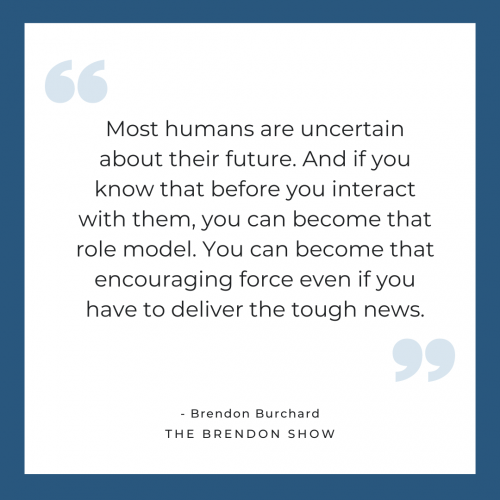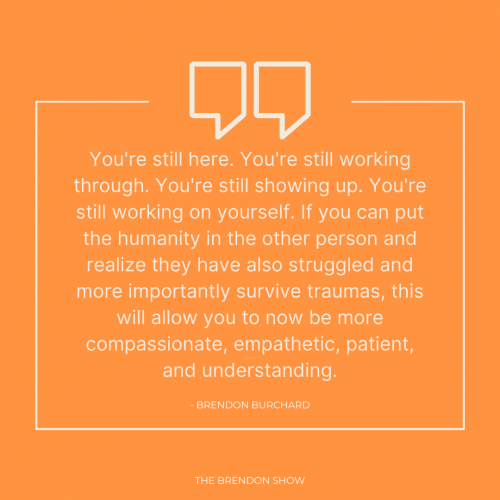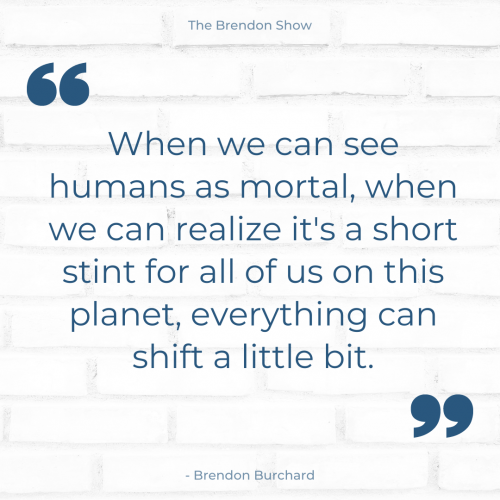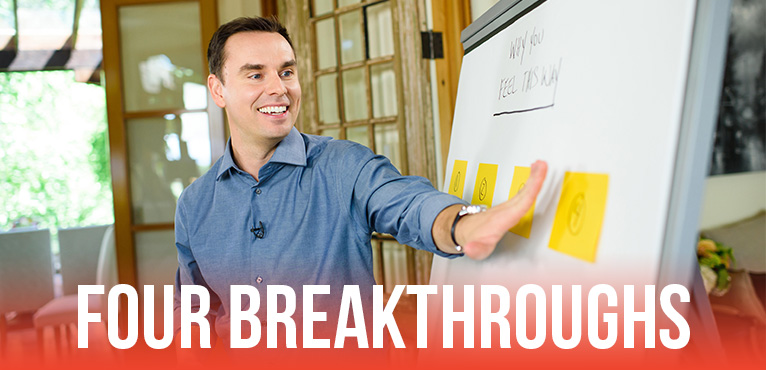SUMMARY
- “If you can put the humanity in the other person and realize they have also struggled and more importantly survive traumas, this will allow you to now be more compassionate, empathetic, patient, and understanding.”
- During conflict situations, it’s crucial that you remember you are a trauma survivor, but you are also dealing with a trauma survivor. In this episode, learn how to treat others with the same empathy and compassion you would have for yourself.
- “We treat people differently when we humanize them.”
- We are all put on this planet for a short period of time. Listen to this episode and remember that the next time you find yourself in conflict with someone and approach the situation with patience.
- Watch the video to get the full training.
- Already have the High Performance Planner and CRUSHING each and every day? Let’s celebrate you! Take a photo with your planner and use #GrowthDay so we can find you on social media!
HOT NEWS & DEALS!
-
Get the Confidence Masterclass
Stop letting limiting beliefs and lack of confidence hold you back! Learn the SKILLS of confidence from 9 of the world’s best personal development experts in the most comprehensive Confidence training ever created! $400 worth of training – just $7.99 today! Get the Confidence Masterclass!
-
Get the GrowthDay app!
Make self-improvement a way of life and get the GrowthDay app! GrowthDay features all your personal development tools, coaching and community in one place. Write your journal, track your habits, take wellness challenges, watch live influencers teaching new life strategies, and join a global community of positive and supportive high achievers excited to improve their lives! Get the app on Apple app store here. Get on Android here. Get desktop here.
DID YOU KNOW?
I give weekly prizes, gratitude and shout-outs to our students, so post a screenshot or video on Instagram and use #TheBrendonShow! I can’t wait to hear your thoughts about this episode!
RELATED POSTS
The 4 Steps To Better Health
Optimize Your Health And Productivity
Tips for Developing Close Relationships
The Friendship Masterclass
Nurturing Great Relationships
FULL TRANSCRIPT
[The following is the full transcript of this episode of The Brendon Show. Please note that this episode, like all TBS episodes, features Brendon speaking extemporaneously–he is unscripted and unedited. Filmed in one take, The Brendon Show has become one of the most viewed unscripted, direct-to-camera self-help series in the history of YouTube. It has also been the #1 Podcast in all of iTunes and is regularly in the top podcasts in the Self-Help and Health categories around the globe. Subscribe to the free motivational podcast on iTunes or Stitcher.)
1. Remember Their Humanity
Please remember any time you have a frustration or conflict or an argument with another person, please remember you are dealing with a trauma survivor. Please remember you are living with a trauma survivor. Please remember you are working with trauma survivors. You yourself have survived traumas and struggles.
Unfortunate incidents, brutalities, difficulties, awful situations in your life – you survived them. You’re still here. You’re still working through. You’re still showing up. You’re still working on yourself. If you can put the humanity in the other person and realize they have also struggled and more importantly survive traumas, this will allow you to now be more compassionate, empathetic, patient, and understanding.
2. Relate Their Current Emotions to Your Past Experiences
Because raise your hand if you think sometimes you’re in a conflict with your spouse or your partner or someone at work and they might be acting out from old triggers and traumas. Raise your hand. Right? You think you’re fighting about the vacuum cleaner. They’re fighting about something that happened in the fifth grade to them. Raise your hand if you know what I’m talking about. The person you’re dealing with in that moment – we always teach like a freshman in college about conflict. You’re not actually there in the moment with that person. One of you is probably in high school or in elementary school. You’re in a situation or a moment in your past that’s being triggered to bring up all these emotions and you’re acting out from the emotion. That’s usually unconscious for most people. Isn’t that true?
The more therapy work, the more coaching, the more perspective, the more self-improvement, the more healing you do, the more you’re aware of those things coming up and they will come up, as we’ll talk about in my next point, but if it’s true that something’s come up for you and it’s uncontrollable or it’s upsetting, it’s happening for the other person too. you, ok.
I can’t believe I’m only like two points into this whole presentation here, but I’m worked up today, ok?
3. Reframe the Interaction in Your Mind
I had a great interaction with a person at work one time that I learned a lot. I was very much – I know this is really hard to understand, but I was productivity Brendon. You know? I was like, man, I was getting stuff done. It’s hard to keep up with me. I am like, I’m very – I’m like, I schedule it, I show up, I deliver it. I schedule it, I show up, I deliver it, and I do it with a positive mindset, and I’m going to make it happen. Like, that was really, really strong in who I was in my twenties. Right? And I remember having this conversation, and well there’s no better way to say it, I was a kind of a condescending jerk to somebody at work. I was just was not nice to this person at work. Early twenties, probably just starting my career in consulting and a partner at the company saw the interaction and she pulled me aside and she asked a question that changed my life.
She said, “Brendon, if you knew that person was dying, how would you have handled that situation?”
And I was like, whoa! I mean, I was like, immediately, I literally went to tears immediately the second she saw it – she said that. Immediately went to tears. It’s like, whoa.
4. Mortality Motivation
Now let me ask you that. Think about the last argument or conflict you had. What if that person was sick? What if that person was hurt? What if that person was dying? Trust me. I know, I know how the pessimists and the people who don’t like personal development would receive this conversation right now. Oh, Brendon, here he goes. You know? I get it. Trust me, you’re not the first person I’ve trained on this topic. Oh, yeah, sure, Brendon. Now I’m supposed to – every time I think about having an argument thinking that they’re going to die. Sure. It’s practical. Maybe it’s not practical, but maybe it’s spiritual. And I say that because there’s not a single person you’re talking to who isn’t dying, not one. You won’t meet a person in your entire life who isn’t dying. That’s what we call in our work, mortality motivation.
When we can see humans as mortal, when we can realize it’s a short stint for all of us on this planet, everything can shift a little bit.
5. Remember What They’ve Gone Through
Now, I know again, people will judge me for this, but remember, this was at work This was a partner who earned millions of dollars at this consulting firm talking to a 20 year old kid who just mouthed off to a coworker, and that was her, this is one of the greatest things I ever met, that was one – that was her ask to me. What if that person was dying?
And what it did is it dropped me right in my humanity to realize we treat people differently when we humanize them or objectify them.
To me, I was objectifying the person. They’re in my way of doing this thing. I’m delivering this feedback. This says they are mortal, they struggle, they need healing, too. And I share this because I really want you to write that down, especially if you have a partner or spouse, an intimate other in your in your life. Really write like, I’m living with a trauma survivor. They’ve had trauma. And when you recognize that, you just talk – isn’t it true? Imagine going into a healing center, into a meditative center, into a therapy session, into, you know, an influence relationship situation where you, you know the person’s been through stuff in their life. Don’t you talk to them differently? Wow. It’s a game-changer. Soon as you know that, it’s like, wow, every person you know who’s been triggered and traumatized in some way, some more dramatically than others, but everyone in some way, especially if they’re past, you know, their teens, they’ve been through it already. They’re already something has happened. And so when you go, OK, let me connect that humanity, let me approach it from that way and it will just shift it. And now that conversation can come into a lot of different ways.
6. Consider How They’re Feeling
Let me give you an example. You’re going to go into that conversation, have that conversation with that underperforming employee or team member at work. There they are sitting in that glass conference room waiting for you to show up. How do they – how do you think they’re feeling right now? They know they’re having a meeting in that glass cube where everyone can walk by and see them talking with the boss. They’re already embarrassed that the conversation has been scheduled. They’re already fearful their job is about to get yanked. They’re already thinking of all the defenses that they need to defend theirselves, their career, their identity, their ego, their mission, their work. They’re already thinking about the last two bosses that didn’t give them a chance. They’re already thinking that they got thrown under the bus by somebody. Is being thrown under the bus traumatic for anybody? Oh, wait. OK. Is being given feedback in public where other people can see it, is that traumatic for anybody? So you’re about to go deliver underperforming conversation with somebody who’s in trauma. They’re like, oh, my God, my boss is coming. I’ve been let down before. Oh, my gosh. Someone probably threw me under the bus. Somebody at work. They reported me. They said I’m not doing a good job. I can’t trust this place. This is not a safe space anymore. You know what? I’ve tried, I’ve put my work, I put my time, I’ve sacrificed for this, and now it’s about to get yanked. How am I going to afford my mortgage? How am I in it for my insurance? How do I take care of the kids? That’s where they’re at. And you’re like, the bastard didn’t hit the numbers. You know what? I’m not saying this is always true. I’m saying they’re in a place of trauma to get the feedback already. And if you can recognize that you’re going to slow your roll, you’re going to change your approach, and you can still get to the same conclusion, perhaps. You can still work through the process.
But it is by recognizing that humans have emotions that have been triggered from the past. Most humans are living in a place of fear. Most humans are uncertain about their future. And if you know that before you interact with them, you can become that role model. You can become that encouraging force even if you have to deliver the tough news. You can be more patient as she explains things to you. You can listen. You can take a beat. You can breathe it out with that person a little bit. You can hold from the judgment. That person is healing from trauma or in trauma. That person is mortal. That person struggles and suffers equally to you, even if you can’t sense it in the moment.





